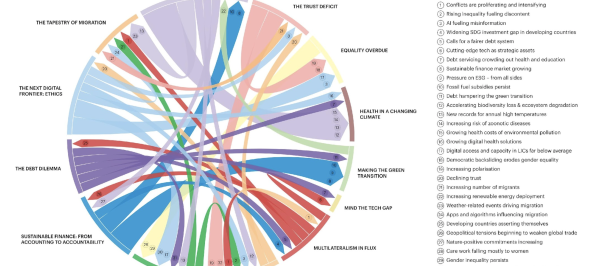Lessons from Istanbul Innovation Days 2025
Rethinking Institutions for a World in Flux
June 27, 2025

“The Times They Are A-Changin” - Bob Dylan, 1964
Worldwide, institutions face challenges such as climate crises, geopolitical shifts, societal polarization, and accelerating technological change. These disruptions demand bold, practical efforts to reimagine how institutions can remain effective, inclusive, and resilient.
While incremental adjustments sufficed in stable times, today's complexity demands institutional evolution. This isn't about starting from scratch, but building on what works, shedding what doesn't, and embracing new possibilities. Current approaches are often insufficient for today's challenges, failing to recognize necessary transformations.
This calls for rethinking core purposes, structures, and operations. Institutions should become more participatory, integrating diverse perspectives and equitably distributing decision-making. They need to adopt regenerative principles that restore environmental and social systems, and develop resilience to withstand shocks, adapt, and transform. This institutional evolution requires bold leadership, systems thinking, and the courage to adapt established models for a sustainable and equitable future.
The 2025 Istanbul Innovation Days (IID2025) explored this urgent need. Here, we highlight three key concepts for innovation in development:
Irreversibility as a Design Principle: Embedding change for lasting impact.
Regenerative Thinking in Institutional Design: Moving beyond sustainability to actively heal and renew.
Data, Trust, and Relational Governance: Rebuilding legitimacy through care and accountability.
Irreversibility as a Design Principle
A standout IID2025 workshop, led by Giulio Quaggiotto and Kautsar Anggakara, focused on designing for irreversibility using the Irreversibility Framework. This structured approach to transformational organisational change guides changemakers in rooting enduring impact beyond short-term successes. Designed to help navigate political and leadership changes and resource fluctuations, the framework outlines irreversibility not as rigid permanence but as a system's capacity to maintain its transformative purpose by continually finding new pathways. The focus is on designing initiatives that are resilient and adaptable over time, embedding lasting value within the system itself rather than preserving a specific project.

IID 2025 Workshop: Should public innovation aim to be irreversible?
This framework addresses four interconnected areas:
Value Creation: What lasting value are we creating, and how do we ensure it lasts?
Value Delivery: How do we deliver this value effectively and adaptively?
Foundational Support: What foundational support is needed to sustain this value over time?
Feedback Loops & Metrics: How do we measure progress toward the shared intent?
Adopting this framework shifts the focus from starting new projects to growing and supporting initiatives that are built to last and adapt over time. It's an ongoing process of strategic reflection, assessing value, delivery, support, and feedback to build resilience. It's a commitment to collective learning, ensuring transformative efforts endure. This framework is particularly useful for policy teams, public sector innovators, and development practitioners aiming to embed resilience in their work.
Regenerative Thinking in Institutional Design
Prof Eduard Müller, founder of Regenerate Costa Rica, encouraged us to move beyond just reducing harm, toward economic models that help restore people and the planet. Referring to Buckminster Fuller, he said: “Don’t fight the system. Build a better one that works.” Regenerative non-extractive economic models focus on giving back more than we take - from nature, communities, and future generations. Unlike traditional models that often exploit resources, regenerative models aim to rebuild ecosystems, strengthen local economies, and support long-term well-being.
Müller’s principles for regenerative institutional thinking include:
Design for Restoration: Restore ecosystems and social cohesion through policies and institutions.
Embrace Systemic Thinking: Adopt a holistic perspective, mirroring living systems for integrated solutions.
Cultivate the Capacity to Unlearn: Critically examine and discard practices that no longer serve social and ecological well-being. As Müller noted, “We don’t need to teach people more – we need to help them unlearn what no longer serves.”
He provided examples from his work in regenerative cattle funding, municipal tax collection, and regenerative tourism. This shift from sustainability to regeneration signifies deep institutional change. Enduring institutions continuously renew, restore the commons, and prioritize future generations. Müller concluded that nature should be our inspiration for innovation.
Data, Trust, and Relational Governance
In another powerful session, Kirikowhai Mikaere from Aotearoa New Zealand National Iwi (Tribal) Chairs Forum reminded us that “trust is the currency of data.” As Lead Technical Advisor for the National Iwi Chairs Forum on Māori Data Governance, she challenged the framing of data as a neutral, extractable asset.
The Te Kāhui Raraunga Māori Data Governance Model asserts Māori authority over Māori data as a taonga (treasure), enabling self-determination and collective wellbeing. Centered on the principle “Data for self-determination,” it offers a values-based approach for public service agencies to govern Māori data ethically and align with Māori priorities. It outlines eight key Data Pou (pillars) covering areas like data protection, access, infrastructure, and workforce development, grounded in principles like accountability, decolonisation, and nurturing data as a sacred resource. The model calls for shared governance, legislative change, and strategic investment to enable genuine partnership and transform Aotearoa’s data ecosystem.
Mikaere urged seeing data as a relationship shaped by care, context, and accountability. She highlighted cultural worldviews in governance, with Māori data governance grounded in principles such as:
Rangatiratanga (autonomy, sovereignty, self-determination or customary leadership)
Manaakitanga (ethics of care, respect and inclusive responsibility)
Kaitiakitanga (trust, stewardship and guardianship of data for future generations)
She stressed that trust must be earned through courageous leadership. "Trust is the currency of data," she reiterated. "We call our leaders Rangatira, those who can weave the people together. And in an insecure and complex world, we need courage, especially the courage to share power." Institutions endure not from size, but from trust, care, and collaborative governance.
A Shared Horizon: Designing Institutions That Endure
IID2025 presented a new vision for public institutions. Themes like irreversibility, relational governance, and regenerative thinking emphasized that enduring institutions require a fundamental shift: designing for lasting relevance, genuine connection and trust, and actively contributing to people and the planet's well-being.
Cross-cutting themes deepened this horizon. Sessions on decision-making under uncertainty highlighted human cognition's role. We explored innovative governance roles like Chief Time Officers and Ministries of Loneliness. Conversations on informality and culture underscored that institutions run on relationships as much as rules. Bold provocations included multi-species collaboration, nature-informed intelligence, and strategic development intelligence.
ID2025's insights emphasize that creating enduring institutions means evolving how we think, build, and relate. It's about embracing innovative designs that are irreversible in impact, trustworthy in operations, and regenerative in essence. This is the shared horizon: building institutions that thrive and foster a more resilient and equitable future.
These ideas offer UNDP Accelerator Labs and Country Offices tangible lenses for navigating complexity. We see potential to apply them in public sector innovation, citizen engagement, and future-skilling. The challenge now is to adopt, localize, and irreversibly embed these concepts within our systems.
For further exploration:
Let’s keep the conversation going.

 Locations
Locations





